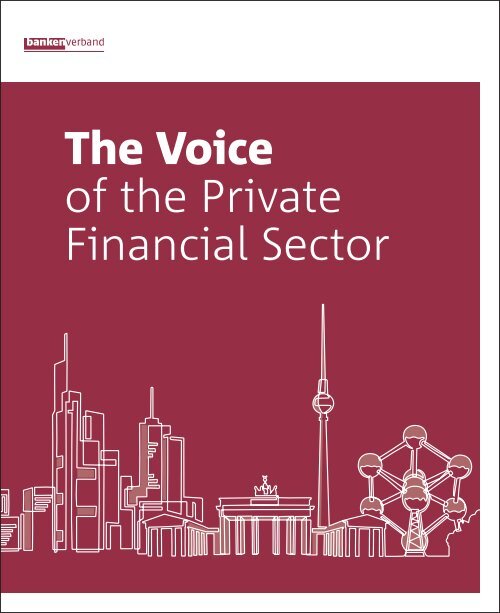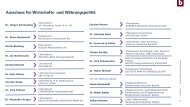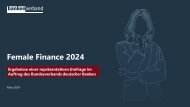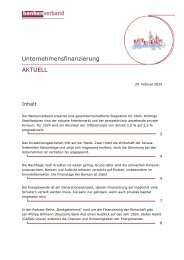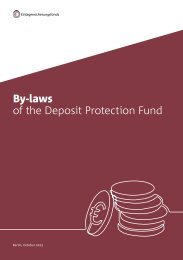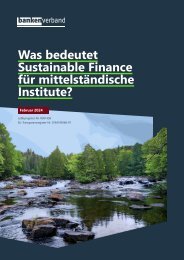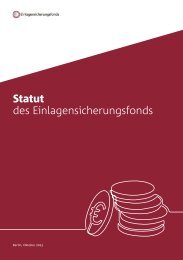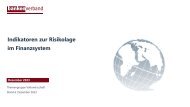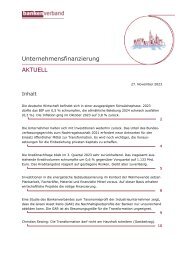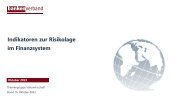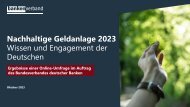The voice of the Private Financial Sector
image booklet about the association of german banks
image booklet about the association of german banks
Create successful ePaper yourself
Turn your PDF publications into a flip-book with our unique Google optimized e-Paper software.
<strong>The</strong> Voice<br />
<strong>of</strong> <strong>the</strong> <strong>Private</strong><br />
<strong>Financial</strong> <strong>Sector</strong>
66<br />
7,755<br />
Contents<br />
million online accounts<br />
in Germany<br />
billion euros <strong>of</strong> total assets in <strong>the</strong> German<br />
banking industry<br />
Who we are ––––––––––––––––––––––––––––––––––––––––––––––––––––––––––– 4<br />
1,403.1<br />
284<br />
private banks<br />
in Germany<br />
What we do ––––––––––––––––––––––––––––––––––––––––––––––––––––––––––– 5<br />
Interview with Hans-Walter Peters ––––––––––––––––––––––––––––––––––––––––– 6<br />
Our way <strong>of</strong> doing things –––––––––––––––––––––––––––––––––––––––––––––––– 10<br />
billion euros in loans granted to<br />
companies and <strong>the</strong> self-employed<br />
86<br />
foreign banks are<br />
members <strong>of</strong> <strong>the</strong><br />
Association <strong>of</strong><br />
German Banks<br />
820,000<br />
girocard terminals in use in <strong>the</strong> retail trade<br />
Where we make a difference ––––––––––––––––––––––––––––––––––––––––––– 11<br />
Digital banking – –––––––––––––––––––––––––––––––––––––––––––––––––––––– 12<br />
Deposit protection –––––––––––––––––––––––––––––––––––––––––––––––––––– 16<br />
Social commitment ––––––––––––––––––––––––––––––––––––––––––––––––––––– 20<br />
Ombudsman scheme <strong>of</strong> <strong>the</strong> private banks –––––––––––––––––––––––––––––––––– 24<br />
Lobbying – ––––––––––––––––––––––––––––––––––––––––––––––––––––––––––– 28<br />
About <strong>the</strong> Association –––––––––––––––––––––––––––––––––––––––––––––––––– 30<br />
[Source: Association <strong>of</strong> German Banks/own calculations | Deutsche Bundesbank | Eurokartensysteme | as at: autumn 2018]
WHO WE ARE<br />
<strong>The</strong> <strong>voice</strong> <strong>of</strong> <strong>the</strong> private<br />
financial sector<br />
WHAT WE DO<br />
Mediate, shape,<br />
build trust<br />
<strong>The</strong> Bundesverband deutscher Banken e. V. (Association<br />
<strong>of</strong> German Banks) was founded in Cologne in<br />
1951 and in 1999 moved its head <strong>of</strong>fice to Berlin,<br />
where it has been ever since. As <strong>the</strong> <strong>voice</strong> <strong>of</strong> <strong>the</strong> private<br />
financial sector, we coordinate, shape and represent <strong>the</strong><br />
interests <strong>of</strong> <strong>the</strong> private banking industry. We act as mediator<br />
between <strong>the</strong> private banks, policymakers and administrators,<br />
consumers and businesses.<br />
<strong>The</strong> Association <strong>of</strong> German Banks is a registered association.<br />
1,823<br />
banks in total in Germany,<br />
including 284 private banks.<br />
31,949<br />
bank branches in Germany,<br />
including 9,288 branches <strong>of</strong><br />
private banks.<br />
<strong>The</strong> Association <strong>of</strong> German Banks pursues a wide<br />
range <strong>of</strong> tasks. Externally, <strong>the</strong> Association defends <strong>the</strong><br />
economic and fundamental interests <strong>of</strong> its members<br />
vis-à-vis policymakers, legislative bodies as well as supervisory<br />
and regulatory authorities – always keeping overall<br />
economic considerations in mind.<br />
Internally, we support our members in implementing statutory<br />
requirements, assist <strong>the</strong>m in legal as well as practical<br />
and political issues and inform <strong>the</strong>m about current political<br />
Our issues<br />
Digitalisation<br />
Banking<br />
supervision<br />
Deposit<br />
protection<br />
Its bodies – <strong>the</strong> Members’ Assembly, Delegates’ Assembly,<br />
We encourage<br />
open dialogue<br />
between<br />
businesses,<br />
Board <strong>of</strong> Directors and<br />
Presidency – are supported<br />
by a full-time Management<br />
Board.<br />
Diversity is <strong>the</strong> hallmark<br />
<strong>of</strong> <strong>the</strong> Association <strong>of</strong><br />
586,250<br />
people employed in <strong>the</strong> banking<br />
industry in Germany, including<br />
approx. 167,450 at private<br />
banks and building societies.<br />
[Source: AGV Banken, as at spring 2018]<br />
and economic developments. In close cooperation with<br />
domestic and foreign associations, we pool our interests,<br />
forge alliances, develop solutions and involve ourselves in<br />
political and economic decision-making processes.<br />
We also inform <strong>the</strong> public about <strong>the</strong> activities <strong>of</strong> private<br />
banks: this is done by providing press releases and information<br />
services, publications and teaching material as well as<br />
<strong>Financial</strong><br />
stability<br />
<strong>Financial</strong><br />
markets<br />
Political<br />
lobbying<br />
Ombudsman<br />
scheme<br />
policymakers<br />
and society.<br />
German Banks. It represents<br />
more than 200 members,<br />
including banks and fintechs<br />
by using social media or staging events.<br />
Two fur<strong>the</strong>r areas <strong>of</strong> responsibility play a key role in building<br />
Legal affairs<br />
Tax<br />
Andreas Krautscheid<br />
Chief Executive<br />
as well as regional associations.<br />
In <strong>the</strong> German<br />
Banking Industry Committee<br />
(GBIC), <strong>the</strong> Association also cooperates with <strong>the</strong> four o<strong>the</strong>r<br />
mutual trust: our ombudsmen and women – independent<br />
mediators – find quick and simple solutions to disputes<br />
between consumers and member institutions. And our<br />
deposit protection fund <strong>of</strong>fers a high degree <strong>of</strong> protection<br />
Corporate<br />
finance<br />
leading financial sector associations. Around 160 employees<br />
for customer deposits.<br />
are responsible for handling <strong>the</strong> day-to-day operations, led<br />
by two Chief Executives and supported by <strong>the</strong> Management<br />
Board members and managing directors.<br />
4 WHO WE ARE<br />
WHAT WE DO<br />
5
IN CONVERSATION<br />
“We need more,<br />
not less, Europe”<br />
In conversation with Hans-Walter Peters,<br />
President <strong>of</strong> <strong>the</strong> Association <strong>of</strong> German Banks.<br />
Hans-Walter Peters has been President <strong>of</strong> <strong>the</strong> Association<br />
<strong>of</strong> German Banks since April 2016. <strong>The</strong> economist and statistician<br />
has a doctorate in political science and has been<br />
working for <strong>the</strong> private bank Berenberg in Hamburg since<br />
1994, first as managing director, later as General Manager<br />
and Managing Partner, and today as Spokesman <strong>of</strong> <strong>the</strong><br />
Personally Liable Partners, responsible for <strong>the</strong> divisions<br />
Wealth and Asset Management, Finance, Compliance,<br />
Legal Affairs and Corporate Communications.<br />
Mr Peters, you’re <strong>the</strong> incumbent President <strong>of</strong><br />
a major turning point. It’s <strong>of</strong>ten <strong>the</strong> case:<br />
recordings made and I’m not <strong>the</strong> only one<br />
How much bureaucracy is involved in today’s<br />
<strong>the</strong> Association <strong>of</strong> German Banks and have<br />
something dramatic happens, and everything<br />
who finds this problematic.<br />
investment and lending business?<br />
been working in <strong>the</strong> banking industry for<br />
is done to prevent it from happening again.<br />
Regulation was essentially correct, but it’s been<br />
more than 40 years. What was it that<br />
This applied to <strong>the</strong> financial sector after 2008<br />
Even if trust in <strong>the</strong> banking industry<br />
far too extensive. Thousands <strong>of</strong> pages <strong>of</strong> new<br />
originally prompted you to pursue a career<br />
as well – and both banks and consumers are<br />
continues to recover after <strong>the</strong> last financial<br />
provisions were implemented, capital ratios<br />
in this particular industry?<br />
feeling <strong>the</strong> consequences even today. That<br />
crisis, banks are regularly <strong>the</strong> target <strong>of</strong><br />
streng<strong>the</strong>ned and supervision tightened. All<br />
After leaving school, I took a joint degree in<br />
sometimes has <strong>the</strong> strangest <strong>of</strong> effects. A<br />
criticism. What achievements would you<br />
in all, <strong>the</strong> pressure to act <strong>of</strong>ten resulted in<br />
statistics and economics. As I already had a<br />
particularly striking example<br />
name in defence <strong>of</strong> banks?<br />
a loss <strong>of</strong> a sense <strong>of</strong> proportion. Policymakers<br />
keen interest in stocks and shares at that time,<br />
this combination proved ideal: when I was<br />
working for my PhD, I applied to a bank – and<br />
was accepted surprisingly quickly. And <strong>the</strong>n<br />
I was “in”, as <strong>the</strong>y say. I’ve remained loyal to<br />
<strong>the</strong> industry to this day as it’s in a continuous<br />
is <strong>the</strong> Markets in <strong>Financial</strong><br />
Instruments Directive (MiFID):<br />
customers today must agree to<br />
allow all <strong>the</strong>ir telephone consultations<br />
with <strong>the</strong>ir banks to be<br />
recorded. And anyone engaging<br />
MiFID is short for <strong>the</strong><br />
Markets in <strong>Financial</strong><br />
Instruments Directive <strong>of</strong><br />
<strong>the</strong> European Union (EU),<br />
which aims to harmonise<br />
financial markets in <strong>the</strong><br />
European internal market.<br />
<strong>The</strong> image <strong>of</strong> banks and customer satisfaction<br />
are <strong>of</strong>ten two quite different things: our surveys<br />
show that 80 per cent <strong>of</strong> customers are satisfied<br />
with <strong>the</strong>ir bank. Banks are evidently able to<br />
help people if <strong>the</strong>y have questions regarding<br />
loans and investments and do <strong>of</strong>fer <strong>the</strong>m<br />
have now recognised this <strong>the</strong>mselves, in <strong>the</strong><br />
USA earlier than here. After imposing countless<br />
regulatory measures in past years, <strong>the</strong>y now<br />
need to give banks some breathing space to<br />
reposition <strong>the</strong>mselves. After all, banks are a<br />
cornerstone <strong>of</strong> <strong>the</strong> economy. By co-financing<br />
process <strong>of</strong> change and <strong>the</strong>re are always new<br />
in intensive discussions with<br />
genuine added value. <strong>The</strong>y are trusted. This is<br />
innovation and German exports, <strong>the</strong>y con-<br />
challenges and interesting tasks and projects to<br />
<strong>the</strong>ir adviser will find <strong>the</strong>mselves<br />
also clearly a consequence <strong>of</strong> <strong>the</strong> crises <strong>of</strong> 2008<br />
tribute to maintaining prosperity and jobs<br />
explore.<br />
talking not only about money but also about<br />
and also 2011; many <strong>of</strong>ferings and services<br />
in Germany. 88 per cent <strong>of</strong> export-oriented<br />
<strong>the</strong>mes such as healthcare, family, career – in<br />
have been redefined and improved since <strong>the</strong>n.<br />
companies have a private bank as a partner.<br />
How has <strong>the</strong> industry changed <strong>of</strong> late?<br />
o<strong>the</strong>r words all aspects <strong>of</strong> life planning. <strong>The</strong><br />
I’m quite confident that <strong>the</strong> reputation <strong>of</strong> banks<br />
Our economic model wouldn’t function if banks<br />
<strong>The</strong> 2008 financial crisis was undoubtedly<br />
customer cannot object to having <strong>the</strong>se<br />
will continue to streng<strong>the</strong>n.<br />
weren’t competitive.<br />
6 IN CONVERSATION<br />
IN CONVERSATION<br />
7
“Our economic<br />
model wouldn’t<br />
function if<br />
banks weren’t<br />
competitive.”<br />
Hans-Walter Peters<br />
President<br />
Looking beyond national borders: would<br />
<strong>the</strong> banking industry benefit from greater<br />
European cooperation?<br />
It most certainly would! We need to work<br />
<strong>The</strong> Association <strong>of</strong> German Banks has also<br />
about how things interrelate. But this encour-<br />
more closely toge<strong>the</strong>r and that requires great-<br />
become involved in school education. Why?<br />
ages us to continue <strong>the</strong> Association’s strong<br />
er coordination. <strong>The</strong> Association <strong>of</strong> German<br />
Toge<strong>the</strong>r with <strong>the</strong> newspaper F. A. Z., we’ve<br />
commitment in this area.<br />
Banks is in clear support <strong>of</strong> more, and not less,<br />
developed a school project called “Jugend<br />
Europe. At a time when borders and isolation<br />
und Wirtschaft” (“Youth and <strong>the</strong> Economy”)<br />
How difficult is it to strike a balance between<br />
are becoming acceptable again, we see an<br />
in order to introduce economic <strong>the</strong>mes into<br />
representing <strong>the</strong> interests <strong>of</strong> banks and those<br />
even greater need to move forward towards a<br />
schools. When we award prizes to <strong>the</strong> authors<br />
<strong>of</strong> consumers?<br />
genuine single financial market. What applies<br />
A brief word on fintechs: rivals or<br />
<strong>of</strong> <strong>the</strong> best articles each year, it’s a pleasure<br />
I don’t see any contradiction here. It’s very<br />
to trade in goods and services in general also<br />
partners and equals?<br />
to see so many young people approaching<br />
much in our own interests to ensure customer<br />
applies to financial services: a single market<br />
Digitalisation will radically transform all areas<br />
business topics with such enthusiasm. But<br />
satisfaction: after all, only a satisfied customer<br />
boosts prosperity. We’re <strong>the</strong>refore faced with<br />
<strong>of</strong> <strong>the</strong> financial industry. Fintechs have initiated<br />
this is still <strong>the</strong> exception in our educational<br />
will remain loyal to his or her bank. Consumer<br />
<strong>the</strong> task <strong>of</strong> rescuing capital markets union<br />
a number <strong>of</strong> developments, and it’s difficult<br />
system: economics does not feature parti c-<br />
protection based on a reasonable cost-benefit<br />
from neglect and promoting it toge<strong>the</strong>r with<br />
to imagine life without <strong>the</strong>m today. <strong>The</strong>y’ve<br />
ularly strongly in lessons in schools. And<br />
ratio is part and parcel <strong>of</strong> <strong>the</strong> banking system,<br />
banking union. Monetary union must also be<br />
become <strong>the</strong> partners <strong>of</strong> banks in many areas;<br />
that in a strong economy like Germany <strong>of</strong><br />
but customers shouldn’t be patronised.<br />
placed on a stable, long-term footing, and this<br />
both sides complement each o<strong>the</strong>r and can<br />
all places! We firmly believe that economics<br />
will inevitably involve reforms. We’re playing<br />
learn from one ano<strong>the</strong>r. We work toge<strong>the</strong>r with<br />
should be put on <strong>the</strong> school curriculum.<br />
a constructive role in this debate in order to<br />
<strong>the</strong>m and are engaged in jointly promoting<br />
<strong>The</strong>re is still too much purely factual knowl-<br />
advance integration in Europe.<br />
new services and products.<br />
edge being taught at schools and not enough<br />
8<br />
IN CONVERSATION<br />
IN CONVERSATION<br />
9
OUR WAY OF DOING THINGS<br />
Transparency<br />
and sound arguments<br />
Responsible political lobbying needs clear ground rules.<br />
This is <strong>the</strong> only way to guarantee a transparent, comprehensible<br />
and politically neutral role in shaping opinion<br />
in politics, administration and among <strong>the</strong> public.<br />
<strong>The</strong> Association <strong>of</strong> German Banks is <strong>the</strong>refore clearly recognisable<br />
as <strong>the</strong> author <strong>of</strong> all our consultation responses, articles and<br />
publications. We are registered in <strong>the</strong> List <strong>of</strong> Associations <strong>of</strong> <strong>the</strong><br />
German Bundestag (Lower Chamber) and in <strong>the</strong> Transparency<br />
Register <strong>of</strong> <strong>the</strong> European Union.<br />
We firmly believe that argument is always <strong>the</strong> most effective<br />
instrument. For this reason, <strong>the</strong> Association does not donate to<br />
or sponsor any political party. Instead, we provide policymakers,<br />
employees <strong>of</strong> public institutions and consumers with a range <strong>of</strong><br />
arguments on current <strong>the</strong>mes – all <strong>the</strong> while being open about<br />
<strong>the</strong> interests <strong>of</strong> our members.<br />
We create transparency through numerous channels. In addition<br />
to traditional press work, <strong>the</strong> Association uses a number <strong>of</strong> social<br />
media and event formats to exchange information and views<br />
with <strong>the</strong> public on issues <strong>of</strong> current interest. For example, <strong>the</strong><br />
Association regularly invites people to public talks, discussions<br />
and dialogues. It also prepares publications for its members,<br />
for small and medium-sized companies and for consumers. We<br />
provide online media with up-to-date content and use social<br />
media channels such as Twitter or Facebook.<br />
“Whe<strong>the</strong>r in<br />
dialogue with<br />
policy makers<br />
or as a point <strong>of</strong><br />
contact for <strong>the</strong><br />
interested<br />
public – an open<br />
and constructive<br />
exchange <strong>of</strong> views<br />
and information<br />
is crucial for a<br />
successful trade<br />
association.”<br />
Hans-Walter Peters<br />
President<br />
Where we make<br />
a difference<br />
Deposit protection<br />
Ombudsman scheme<br />
Social commitment<br />
Lobbying<br />
Digital banking<br />
10 OUR WAY OF DOING THINGS<br />
WHERE WE MAKE A DIFFERENCE<br />
11
DIGITAL BANKING<br />
Primed for<br />
tomorrow’s banking<br />
Digitalisation is also well on <strong>the</strong> advance in <strong>the</strong> banking sector.<br />
Toge<strong>the</strong>r with its members, <strong>the</strong> Association <strong>of</strong> German Banks is fully<br />
embracing this issue.<br />
Fur<strong>the</strong>r information on this <strong>the</strong>me (in<br />
German) can be found on our website<br />
bankenverband.de/fach<strong>the</strong>men/<br />
digitalbanking/<br />
“<strong>The</strong> rules <strong>of</strong> <strong>the</strong> game<br />
have changed.”<br />
Andreas Krautscheid<br />
Chief Executive<br />
Three questions for Andreas Krautscheid<br />
In brief<br />
Digital transformation also<br />
represents a key challenge<br />
for <strong>the</strong> financial sector. <strong>The</strong><br />
Association <strong>of</strong> German Banks<br />
monitors and supports<br />
developments with its<br />
comprehensive expertise and<br />
network <strong>of</strong> specialists, identifying<br />
opportunities and<br />
potential, and working in<br />
close alliance with fintechs<br />
to ensure that tomorrow’s<br />
banking is secure, reliable<br />
and customer-friendly.<br />
How is <strong>the</strong> Association <strong>of</strong> German Banks positioning itself with<br />
regard to digitalisation? Digitalisation means new rules and changes<br />
for <strong>the</strong> financial industry – and we see ourselves at <strong>the</strong> forefront <strong>of</strong> this<br />
development. Both internal processes and <strong>the</strong> relations with our customers<br />
will experience an improvement in quality and become more cost-effective<br />
and individualised. Fintechs are also playing a key role here, which is why<br />
we opened our membership to fintechs at an early stage.<br />
What are <strong>the</strong> challenges? Digitalisation means rapid change, and<br />
requires excellent technological knowledge and a high level <strong>of</strong> customer<br />
understanding. As an association, it is imperative that we understand and<br />
evaluate innovations early on – and position ourselves as an innovative<br />
and reliable platform for <strong>the</strong> exchange <strong>of</strong> views and information between<br />
banks and fintechs, policymakers, supervisors and society.<br />
Why is <strong>the</strong> Association <strong>of</strong> German Banks <strong>the</strong> right partner for this?<br />
As a leading association, we represent a closely-interwoven international<br />
network characterised by competence and a sense <strong>of</strong> responsibility. We<br />
are experts on <strong>the</strong> regulation <strong>of</strong> bank-specific, technological processes<br />
and <strong>of</strong>fer o<strong>the</strong>rs <strong>the</strong> opportunity to share expertise fairly and develop<br />
common positions.<br />
12 DIGITAL BANKING DIGITAL BANKING<br />
13
DIGITAL BANKING<br />
Viewing transformation<br />
as an opportunity<br />
<strong>The</strong> Association <strong>of</strong> German Banks supports <strong>the</strong> digital trans-<br />
Member banks<br />
Aareal<br />
Bank AG<br />
formation processes in <strong>the</strong> banking sector and is involved in<br />
multiple activities. Here are some <strong>of</strong> <strong>the</strong> most important:<br />
Digital Banking Project Committee<br />
<strong>The</strong> Association supports <strong>the</strong> alliance between banks and<br />
fintechs – through, among o<strong>the</strong>r things, <strong>the</strong> Digital Banking<br />
Project Committee founded in 2017. <strong>The</strong> committee, which<br />
ING-DiBa AG<br />
Commerzbank<br />
AG<br />
Deutsche<br />
Postbank AG<br />
M.M.Warburg<br />
& CO<br />
Santander<br />
Consumer<br />
Bank<br />
Deutsche<br />
Bank AG<br />
DIGITAL BANKING FORUM<br />
In tune with <strong>the</strong> times<br />
<strong>The</strong> Association <strong>of</strong> German Banks regularly invites guests to <strong>the</strong> Digital Banking<br />
brings toge<strong>the</strong>r chief digital <strong>of</strong>ficers <strong>of</strong> banks and leading<br />
figures from <strong>the</strong> German fintech industry, is rigorously<br />
UniCredit<br />
Bank AG<br />
TARGOBANK<br />
AG<br />
Forum. This event aims to pool <strong>the</strong> expertise <strong>of</strong> brilliant minds from politics,<br />
business, <strong>the</strong> banking world and <strong>the</strong> fintech scene and find answers to <strong>the</strong> pressing<br />
driving <strong>the</strong> interdisciplinary issue <strong>of</strong> digitalisation.<br />
Wirecard<br />
Bank AG<br />
questions <strong>of</strong> digitalisation.<br />
Its activities were launched in April 2016 at <strong>the</strong> Digital Banking<br />
Communications Forum, where around 40 fintechs met<br />
with representatives <strong>of</strong> banks and <strong>the</strong> Association <strong>of</strong> German<br />
Banks. In various working groups, discussions focused on<br />
<strong>the</strong>mes <strong>of</strong> equal relevance for banks and fintechs – from<br />
<strong>the</strong> European Payment Services Directive PSD2 and digital<br />
investing (RoboAdvice) to <strong>the</strong> fight against money laundering.<br />
Since <strong>the</strong>n, <strong>the</strong> forum has been convening four times a year.<br />
Fintechs in <strong>the</strong> Association <strong>of</strong> German Banks<br />
<strong>The</strong> number <strong>of</strong> fintechs which have joined <strong>the</strong> Association as<br />
extraordinary members is growing steadily. By autumn 2018<br />
<strong>the</strong>re were more than 20.<br />
Fintechs<br />
Deposit<br />
Solution<br />
Finleap<br />
Idnow GmbH<br />
Digital Banking<br />
Project Committee<br />
Elinvar<br />
GmbH<br />
<strong>The</strong> NAGA<br />
Group AG<br />
Masterfin<br />
GmbH<br />
GIROMATCH<br />
GmbH<br />
Figo GmbH<br />
Cash<br />
Payment<br />
Solution<br />
GmbH<br />
Through lectures, panels and lively discussions, we search for answers, positions<br />
and, not least, solutions that can be translated into practice. For us, <strong>the</strong> key point<br />
regarding digitalisation is to focus not simply on <strong>the</strong> technological possibilities<br />
but also on <strong>the</strong> related political, economic and social issues with <strong>the</strong> latest developments<br />
in mind.<br />
<strong>The</strong> 2017 Digital Banking Forum, for example, dealt with Brexit and its impact<br />
on <strong>the</strong> financial centres <strong>of</strong> Frankfurt and Berlin, while <strong>the</strong> 2018 event explored <strong>the</strong><br />
position Germany could secure for itself in a digital world <strong>of</strong> <strong>the</strong> future.<br />
Introduced in 2016, <strong>the</strong> Digital Banking Forum has become a permanent feature on<br />
<strong>the</strong> events calendar <strong>of</strong> <strong>the</strong> Association <strong>of</strong> German Banks and continues to be held<br />
once a year. We look forward to many exciting discussions.<br />
14 DIGITAL BANKING<br />
DIGITAL BANKING<br />
15
DEPOSIT PROTECTION<br />
Making sure your<br />
money is safe<br />
Deposit protection safeguards consumers and ensures financial stability.<br />
Deposit protection exists in numerous countries – but <strong>the</strong> comprehensive cover<br />
provided by <strong>the</strong> German deposit protection system is unique across <strong>the</strong> world.<br />
150<br />
Approx. 150 member banks<br />
participate in <strong>the</strong> voluntary<br />
protection scheme<br />
1976<br />
<strong>The</strong> year in which <strong>the</strong> Association <strong>of</strong> German Banks<br />
founded its voluntary protection scheme<br />
20<br />
<strong>The</strong> protection ceiling is<br />
currently 20 per cent <strong>of</strong> a bank’s<br />
own funds*<br />
*From 2020: 15%<br />
In brief<br />
<strong>The</strong> German financial<br />
sector <strong>of</strong>fers its customers<br />
a unique level <strong>of</strong> protection<br />
<strong>The</strong> main purpose <strong>of</strong> <strong>the</strong> Deposit Protection Fund is to ensure<br />
trust. And with good reason – in <strong>the</strong> interests <strong>of</strong> investors,<br />
it provides assistance to banks faced with or already experiencing<br />
financial difficulties, in particular an imminent suspension<br />
<strong>of</strong> payments.<br />
for <strong>the</strong>ir savings. Statutory<br />
and voluntary protection<br />
schemes combine to form<br />
a system that ensures<br />
security and stability in <strong>the</strong><br />
financial sector. As mediator<br />
between policymakers<br />
<strong>The</strong> protection covers call, time and savings deposits, i. e. credit balances<br />
on current accounts, savings accounts, and instant access and fixed-term<br />
deposit accounts, up to a bank’s individual protection ceiling. <strong>The</strong> Deposit<br />
Protection Fund covers solely non-bank deposits, primarily <strong>the</strong> assets <strong>of</strong><br />
private individuals. At <strong>the</strong> moment, <strong>the</strong> protection ceiling per customer is<br />
20 per cent <strong>of</strong> a bank’s own funds.<br />
and financial institutions,<br />
<strong>the</strong> Association <strong>of</strong> German<br />
Banks plays a key role in<br />
continuously developing<br />
this protection system.<br />
If <strong>the</strong> Federal <strong>Financial</strong> Supervisory Authority (BaFin) reaches <strong>the</strong> conclusion<br />
that a bank has no chance <strong>of</strong> continuing its business activities, or<br />
if <strong>the</strong> moratorium has already been in place for six weeks, BaFin determines<br />
that a so-called compensation event has occurred. This is when<br />
<strong>the</strong> Deposit Protection Fund steps into action by first informing investors<br />
and <strong>the</strong>n providing <strong>the</strong>m with compensation.<br />
16 DEPOSIT PROTECTION DEPOSIT PROTECTION<br />
17
DEPOSIT PROTECTION<br />
<strong>The</strong> Deposit<br />
Protection Scheme<br />
at a glance<br />
<strong>The</strong> Deposit Protection Fund has been in existence<br />
since 1976 and almost all private banks in Germany<br />
are members. In 1998 it was supplemented by <strong>the</strong><br />
statutory Compensation Scheme <strong>of</strong> German <strong>Private</strong> Banks<br />
(Entschädigungseinrichtung deutscher Banken, or “EdB”).<br />
<strong>The</strong> voluntary Deposit Protection Fund takes over as soon<br />
as <strong>the</strong> limit <strong>of</strong> <strong>the</strong> EdB’s statutory deposit guarantee is<br />
reached. If a participating bank becomes insolvent, <strong>the</strong><br />
Deposit Protection Fund pays compensation for deposits<br />
exceeding 100,000 euros up to <strong>the</strong> level <strong>of</strong> <strong>the</strong> bank’s<br />
protection ceiling.<br />
<strong>The</strong> fund is financed by regular payments from <strong>the</strong> participating<br />
banks. An obligation also exists for members to<br />
make additional contributions to provide assistance over<br />
and above <strong>the</strong>ir regular payments, should need be.<br />
Comparison between voluntary<br />
and statutory deposit protection<br />
<strong>The</strong> statutory Compensation Scheme<br />
<strong>of</strong> German <strong>Private</strong> Banks (EdB)<br />
protects 100 per cent <strong>of</strong> deposits,<br />
but only up to a maximum <strong>of</strong><br />
100,000 euros per customer. Ninety<br />
per cent <strong>of</strong> liabilities arising from<br />
securities transactions are also<br />
covered, but only to a maximum <strong>of</strong><br />
20,000 euros per customer.<br />
<strong>The</strong> Deposit Protection Fund <strong>of</strong> <strong>the</strong><br />
private banking sector steps into<br />
action when <strong>the</strong> limits <strong>of</strong> <strong>the</strong> statutory<br />
deposit guarantee have been<br />
reached. <strong>The</strong> protection ceiling per<br />
customer is 20 per cent* <strong>of</strong> <strong>the</strong> bank’s<br />
own funds.<br />
What does that mean in concrete<br />
terms?<br />
A bank in Germany is required to<br />
have own funds <strong>of</strong> at least 5 million<br />
euros. This would mean that up to<br />
1 million euros would be protected per<br />
customer. In most cases, however,<br />
banks have significantly higher levels<br />
<strong>of</strong> regulatory capital. <strong>The</strong> average protection<br />
ceiling is currently 190 million<br />
euros per customer and bank.<br />
Three questions for<br />
Christian Ossig<br />
Why do we have a voluntary deposit protection<br />
scheme when a statutory deposit<br />
guarantee already exists?<br />
<strong>The</strong> fund was set up by <strong>the</strong> private banks in<br />
1976, in o<strong>the</strong>r words long before a statutory<br />
deposit guarantee even existed. It was established<br />
in response to <strong>the</strong> insolvency <strong>of</strong> Herstatt<br />
Bank, one <strong>of</strong> <strong>the</strong> biggest bank insolvencies<br />
in post-war German history. <strong>The</strong> objective <strong>of</strong><br />
<strong>the</strong> fund was to protect customers <strong>of</strong> private<br />
“Deposit protection<br />
makes a major<br />
contribution to financial<br />
stability in Germany.”<br />
Christian Ossig<br />
Chief Executive<br />
banks from losses in <strong>the</strong> event <strong>of</strong> a bank insolvency without at <strong>the</strong> same time rendering <strong>the</strong> laws <strong>of</strong><br />
<strong>the</strong> market redundant. It should be possible for a bank to disappear from <strong>the</strong> market if it is poorly<br />
managed, for example. <strong>The</strong> Deposit Protection Fund protects <strong>the</strong> savers – not <strong>the</strong> bank.<br />
Was it possible to meet each compensation claim in <strong>the</strong> past?<br />
Since <strong>the</strong> fund was established, compensation has been paid out in around 30 cases. To this day,<br />
every customer with an eligible claim has been fully compensated. <strong>The</strong> voluntary deposit protection<br />
system has been in operation for over 40 years and makes a significant contribution to financial<br />
stability in Germany.<br />
How do <strong>the</strong> voluntary Deposit Protection Fund and <strong>the</strong> statutory deposit guarantee work<br />
toge<strong>the</strong>r? Does <strong>the</strong> customer have to contact two institutions?<br />
If a bank participates in both systems, <strong>the</strong> statutory deposit guarantee scheme pays compensation<br />
up to a coverage limit <strong>of</strong> 100,000 euros. <strong>The</strong> Deposit Protection Fund takes care <strong>of</strong> <strong>the</strong> amount<br />
in excess <strong>of</strong> that up to a ceiling <strong>of</strong> generally at least 1,000,000 euros. <strong>The</strong> compensation from<br />
both systems is provided from a single source and is paid out by <strong>the</strong> Deposit Protection Fund. <strong>The</strong><br />
customer receives a single transfer <strong>of</strong> funds. <strong>The</strong> process is <strong>the</strong>refore simple, convenient and safe<br />
for <strong>the</strong> customer.<br />
*From 2020: 15%<br />
18 DEPOSIT PROTECTION DEPOSIT PROTECTION<br />
19
SOCIAL COMMITMENT<br />
Knowledge<br />
that counts<br />
70%<br />
<strong>of</strong> young persons consider<br />
economic information to be<br />
important or very important<br />
65%<br />
<strong>of</strong> young persons and young adults<br />
(14 to 24 years) want economics to be<br />
put on <strong>the</strong> school curriculum<br />
<strong>The</strong> economic and financial world is complex. It is <strong>the</strong>refore important to<br />
impart basic knowledge to schoolchildren from <strong>the</strong> very beginning and thus<br />
give <strong>the</strong>m a sense <strong>of</strong> direction. This is where <strong>the</strong> Association <strong>of</strong> German<br />
Banks comes into play.<br />
34%<br />
<strong>of</strong> 14 to 24-year-olds assess <strong>the</strong>ir own economic<br />
knowledge as poor or very poor<br />
[Source: Association <strong>of</strong> German Banks, as at: summer 2018<br />
(Youth Survey)]<br />
In brief<br />
In most cases, insufficient<br />
time is given to ensuring a<br />
sound transfer <strong>of</strong> knowledge<br />
<strong>The</strong>re is a social consensus that greater significance needs to<br />
be attached to economic <strong>the</strong>mes in <strong>the</strong> classroom. Even young<br />
people believe this to be <strong>the</strong> case. However, school curricula<br />
do not usually set aside sufficient hours for teaching such a<br />
complex issue as economics.<br />
<strong>of</strong> economic <strong>the</strong>mes. For<br />
years, <strong>the</strong> Association <strong>of</strong><br />
German Banks has attached<br />
great importance to promoting<br />
<strong>the</strong> teaching <strong>of</strong> economics<br />
in schools and arousing<br />
Yet young people require this knowledge if <strong>the</strong>y are to find <strong>the</strong>ir way<br />
around in <strong>the</strong> world <strong>of</strong> economics and finance. It creates a foundation<br />
not only for a competent and critical examination <strong>of</strong> <strong>the</strong> economy and<br />
society but also for everyday purchasing decisions, financial investments<br />
and personal financial planning – right up to provision for retirement.<br />
<strong>the</strong> interest <strong>of</strong> young people<br />
in <strong>the</strong> economy.<br />
For years, <strong>the</strong> Association <strong>of</strong> German Banks has <strong>the</strong>refore set itself <strong>the</strong><br />
task <strong>of</strong> arousing young people’s interest in business and financial <strong>the</strong>mes,<br />
imparting knowledge to <strong>the</strong>m and providing <strong>the</strong>m with orientation.<br />
It supports teachers, among o<strong>the</strong>rs, with a broad range <strong>of</strong> information<br />
material and resources – an important contribution within <strong>the</strong> context<br />
<strong>of</strong> its social responsibility. At <strong>the</strong> political level, <strong>the</strong> Association has long<br />
called for economics to be taught in schools as a subject in its own right.<br />
20 SOCIAL COMMITMENT<br />
SOCIAL COMMITMENT<br />
21
SOCIAL COMMITMENT<br />
Imparting knowledge –<br />
interactively and creatively<br />
From teaching material and youth-friendly textbooks<br />
on <strong>the</strong> subject <strong>of</strong> economics to interactive role-playing<br />
games on all aspects <strong>of</strong> money – <strong>the</strong> Association <strong>of</strong><br />
German Banks <strong>of</strong>fers a comprehensive range <strong>of</strong> information<br />
and teaching resources for schools. Two particular<br />
highlights are <strong>the</strong> bank simulation game “SCHULBANKER”<br />
(“School Banker”) and <strong>the</strong> newspaper project “Jugend und<br />
Wirtschaft” (“Youth and <strong>the</strong> Economy”). Every year, <strong>the</strong><br />
Association <strong>of</strong> German Banks organises two well-known and<br />
renowned nationwide competitions for schoolchildren.<br />
What’s it like to run your own bank? This is what schoolchildren<br />
in grades 9 to 13 experience with “SCHULBANKER”.<br />
Each team slips into <strong>the</strong> role <strong>of</strong> a bank board member and<br />
makes entrepreneurial decisions <strong>of</strong> <strong>the</strong> kind made by bank<br />
managers in real life. <strong>The</strong> goal is to manage your own virtual<br />
bank as successfully as possible over <strong>the</strong> entire period <strong>of</strong><br />
<strong>the</strong> competition.<br />
“Youth and <strong>the</strong> Economy” is a project for <strong>the</strong> upper secondary<br />
level which was initiated by <strong>the</strong> newspaper Frankfurter<br />
Allgemeine Zeitung (F.A.Z.) and <strong>the</strong> Association <strong>of</strong> German<br />
Banks in 2000 and in which around 60 schools participate<br />
every year. During <strong>the</strong> project, <strong>the</strong> young people work with<br />
<strong>the</strong> newspaper for a whole school year, reading and analysing<br />
<strong>the</strong> business section, in particular, researching economic topics<br />
and writing <strong>the</strong>ir own articles. <strong>The</strong> best articles appear once<br />
a month in <strong>the</strong> business section <strong>of</strong> <strong>the</strong> F. A.Z. on <strong>the</strong> “Jugend<br />
und Wirtschaft” project page as well as online at faz.net.<br />
You can find information (in German)<br />
on <strong>the</strong> Association’s <strong>of</strong>ferings for<br />
schools on <strong>the</strong> website schulbank.de<br />
“A valuable<br />
experience”<br />
Reading newspapers, analysing texts – and <strong>the</strong>n writing your<br />
own articles: in <strong>the</strong> school competition “Youth and <strong>the</strong> Economy”<br />
(JuWi) organised by <strong>the</strong> Association <strong>of</strong> German Banks<br />
and <strong>the</strong> Frankfurter Allgemeine Zeitung (F. A. Z.), precisely this<br />
becomes an important part <strong>of</strong> lessons. What do those taking<br />
part say? What do schoolchildren and teachers learn from <strong>the</strong><br />
project? This is what three former participants have to say:<br />
“JuWi opens doors<br />
to apprenticeships<br />
and scholarships.”<br />
Angelika Krombach<br />
Siegburg Vocational College (teacher)<br />
“<strong>The</strong> project has given<br />
me skills I’ll need<br />
later on in working<br />
life – including <strong>the</strong><br />
need to be persistent<br />
on occasion.”<br />
Ben Erik Mühlhaus<br />
Eichsfeld Grammar School Duderstadt (pupil)<br />
20<br />
For 20 years, <strong>the</strong> Association<br />
<strong>of</strong> German Banks has been<br />
organising <strong>the</strong> simulation<br />
game “Schulbanker”<br />
80,000<br />
Approx. 80,000 pupils have taken part<br />
so far in 16,000 teams<br />
900<br />
900 teams with 4,000 young<br />
persons participate in each round –<br />
20 <strong>of</strong> which reach <strong>the</strong> final<br />
“JuWi showed me<br />
just what school -<br />
children can achieve.<br />
And I gained valuable<br />
insight into <strong>the</strong><br />
globalisation <strong>of</strong> <strong>the</strong><br />
economy and its<br />
consequences.”<br />
Florina Feßler<br />
Hohenstaufen Grammar School Kaiserslautern (pupil)<br />
22<br />
SOCIAL COMMITMENT<br />
SOCIAL COMMITMENT<br />
23
THE OMBUDSMAN SCHEME OF THE PRIVATE BANKS<br />
Solving conflicts,<br />
building trust<br />
Customers who feel that <strong>the</strong>y have been treated unfairly do not need to<br />
take <strong>the</strong> matter straight to court. <strong>The</strong> ombudsman scheme <strong>of</strong>fers free and<br />
unbureaucratic assistance.<br />
1992<br />
<strong>The</strong> year in which <strong>the</strong> ombudsmen<br />
and women took up <strong>the</strong>ir work<br />
214,000<br />
6<br />
Almost 214,000 applications for dispute resolution have<br />
now been processed in <strong>the</strong> ombudsman scheme<br />
independent judges<br />
handle <strong>the</strong> requests for<br />
dispute resolution<br />
You can find out more about <strong>the</strong><br />
ombudsman scheme on <strong>the</strong> website<br />
en.bankenverband.de/ombudsman<br />
In brief<br />
If a customer and bank are<br />
unable to resolve a conflict<br />
<strong>the</strong>mselves, <strong>the</strong> services <strong>of</strong><br />
<strong>the</strong> ombudsmen and women<br />
can be sought. <strong>The</strong>se are<br />
independent persons –<br />
retired high court judges –<br />
who help clients in disputes<br />
with <strong>the</strong>ir private bank<br />
by means <strong>of</strong> an unbureaucratic<br />
out-<strong>of</strong>-court dispute<br />
resolution procedure. <strong>The</strong>y<br />
bring both sides toge<strong>the</strong>r in<br />
a spirit <strong>of</strong> cooperation, work<br />
out solutions and help to<br />
restore trust.<br />
More than 25 years<br />
at <strong>the</strong> service <strong>of</strong> customers<br />
<strong>The</strong> ombudsmen and women symbolise independence, neutra l-<br />
ity and trust. Thanks to <strong>the</strong>ir assertiveness and competence,<br />
<strong>the</strong> dispute resolution procedure <strong>of</strong> <strong>the</strong> private banks enjoys<br />
a high level <strong>of</strong> acceptance among customers, banks and <strong>the</strong><br />
general public. Successful dispute resolution is based not only on <strong>the</strong><br />
rules <strong>of</strong> procedure but also, and in particular, on <strong>the</strong> personalities <strong>of</strong><br />
those holding <strong>of</strong>fice. <strong>The</strong> ombudsmen and women <strong>of</strong> <strong>the</strong> Association <strong>of</strong><br />
German Banks not only give <strong>the</strong> proceedings a “face” but also reach <strong>the</strong><br />
decisions <strong>the</strong>y issue independently and autonomously. In <strong>the</strong> summer<br />
<strong>of</strong> 2017, <strong>the</strong> ombudsman scheme <strong>of</strong> <strong>the</strong> private banks turned 25. <strong>The</strong> statistics<br />
and subject matter <strong>of</strong> <strong>the</strong> dispute resolution cases reveal a remarkable<br />
development: in 2017, with around 5,300 applications for dispute<br />
resolution, <strong>the</strong> number <strong>of</strong> cases fell for <strong>the</strong> second year in succession.<br />
24<br />
THE OMBUDSMAN SCHEME OF THE PRIVATE BANKS<br />
THE OMBUDSMAN SCHEME OF THE PRIVATE BANKS<br />
25
THE OMBUDSMAN SCHEME OF THE PRIVATE BANKS<br />
How <strong>the</strong> scheme<br />
works<br />
“I ensure<br />
a fair balance <strong>of</strong><br />
interests”<br />
Independent ombudsmen and women help customers<br />
in disputes with <strong>the</strong>ir private bank by means <strong>of</strong> an<br />
unbureaucratic out-<strong>of</strong>-court disute resolution procedure.<br />
<strong>The</strong> procedures and individual steps<br />
<strong>of</strong> <strong>the</strong> ombudsman scheme are precisely<br />
regulated and transparent.<br />
How did you become an ombudswoman?<br />
I was approached by a colleague who had also<br />
been a presiding judge at <strong>the</strong> Federal Court <strong>of</strong><br />
banking fees and charges<br />
are <strong>the</strong> most frequent.<br />
As early as 1992, <strong>the</strong> Association <strong>of</strong> German Banks and its<br />
Justice and who, after his retirement, became<br />
How, in your opinion,<br />
members broke new ground with <strong>the</strong>ir efficient form <strong>of</strong><br />
an ombudsman for <strong>the</strong> private banks. This<br />
can disputes between<br />
resolving disputes and were thus able to meet changing<br />
consumer demands.<br />
In <strong>the</strong> event <strong>of</strong> a dispute, <strong>the</strong> <strong>of</strong>fice <strong>of</strong> <strong>the</strong> ombudsman<br />
1<br />
Written application submitted<br />
to <strong>the</strong> <strong>of</strong>fice <strong>of</strong> <strong>the</strong><br />
ombudsman scheme<br />
2<br />
Application checked<br />
for admissibility and<br />
jurisdiction<br />
colleague asked me if I would also be interested<br />
in such work. And since I didn’t want to retire<br />
immediately at <strong>the</strong> age <strong>of</strong> 65, I was very happy<br />
to be <strong>of</strong>fered such a rewarding and wide-rang-<br />
banks and consumers<br />
be prevented from<br />
occurring in <strong>the</strong> first<br />
place?<br />
Gerda Müller has been<br />
an ombudswoman since 1<br />
August 2009. She worked<br />
scheme examines <strong>the</strong> application for dispute resolution and<br />
ing legal post – and accepted it immediately.<br />
<strong>The</strong> banks could some-<br />
as a judge at <strong>the</strong> Local<br />
passes it on to <strong>the</strong> management <strong>of</strong> <strong>the</strong> relevant bank. <strong>The</strong><br />
bank now has one month to comment on <strong>the</strong> complaint.<br />
If <strong>the</strong> bank agrees with <strong>the</strong> customer and resolves <strong>the</strong><br />
dispute to <strong>the</strong> customer’s satisfaction, <strong>the</strong> matter is settled<br />
3<br />
Application forwarded to bank<br />
for comment<br />
What skills does a good ombudsman or<br />
ombudswoman need?<br />
Above all, sensitivity towards <strong>the</strong> special<br />
times explain <strong>the</strong>ir<br />
actions better. I <strong>of</strong>ten<br />
find customers are<br />
unable to understand<br />
and Regional Court in<br />
Mannheim, at <strong>the</strong> Higher<br />
Regional Court in Hamm<br />
and as presiding judge at<br />
<strong>the</strong>re and <strong>the</strong>n. If <strong>the</strong> dispute cannot be settled, <strong>the</strong> case is<br />
submitted to <strong>the</strong> responsible ombudsman or woman for a<br />
A1<br />
B1<br />
issues arising from <strong>the</strong> relationship between<br />
customers and <strong>the</strong>ir bank. And, <strong>of</strong> course,<br />
exactly how banks<br />
operate. This is particu-<br />
<strong>the</strong> Federal Court <strong>of</strong> Justice,<br />
where she was appointed<br />
decision. <strong>The</strong> decision is forwarded to both parties directly.<br />
If <strong>the</strong> amount in dispute does not exceed 10,000 euros,<br />
<strong>the</strong> decision is binding on <strong>the</strong> bank. If <strong>the</strong> customer is not<br />
Bank agrees with applicant’s<br />
claim and dispute is resolved<br />
Bank rejects applicant’s<br />
claim<br />
extensive general legal knowledge, especially<br />
<strong>of</strong> banking law.<br />
larly <strong>the</strong> case when third<br />
parties are involved,<br />
such as when ano<strong>the</strong>r<br />
Vice President in 2005.<br />
satisfied, he or she can take legal action at any time. For<br />
What motivates you in your daily work?<br />
bank takes over an<br />
customers, <strong>the</strong> procedure is free <strong>of</strong> charge and entails no risk:<br />
B2<br />
My primary goal is to settle <strong>the</strong> applications for<br />
existing loan agreement. But customers could<br />
if <strong>the</strong> application is successful, <strong>the</strong>y are granted <strong>the</strong>ir rights<br />
quickly and easily. <strong>The</strong> suspension <strong>of</strong> <strong>the</strong> statute <strong>of</strong> limitations<br />
is governed by section 204 <strong>of</strong> <strong>the</strong> German Civil Code.<br />
Applicant may comment on bank’s statement. Case is<br />
referred to <strong>the</strong> responsible ombudsman or woman.<br />
dispute resolution quickly, to seek an amicable<br />
solution and achieve a fair balance <strong>of</strong> interests<br />
between both parties.<br />
also do more: it always makes to sense to<br />
read documents from <strong>the</strong> bank carefully. As in<br />
everyday life, taking a critical view and carefully<br />
examining things never does anybody any harm<br />
Incidentally: on average around half <strong>of</strong> cases have been<br />
B4<br />
B3<br />
Are <strong>the</strong>re complaints that occur particularly<br />
(she laughs).<br />
decided in favour <strong>of</strong> <strong>the</strong> customer up to now.<br />
If dissatisfied, applicant can<br />
take <strong>the</strong> dispute to court<br />
Decision issued and<br />
forwarded to both parties<br />
frequently?<br />
All in all, <strong>the</strong> issues vary greatly. Complaints<br />
regarding incorrect investment advice or<br />
26<br />
THE OMBUDSMAN SCHEME OF THE PRIVATE BANKS<br />
THE OMBUDSMAN SCHEME OF THE PRIVATE BANKS<br />
27
LOBBYING<br />
Focus<br />
on Europe<br />
Europe is our home market – both<br />
economically and politically. <strong>The</strong> private<br />
banks want more Europe and a better<br />
We must now use this momentum to make<br />
cross-border financial services more attractive<br />
to consumers and businesses. This requires a<br />
requirements without unnecessarily burdening<br />
European banks. Fur<strong>the</strong>r progress is also<br />
required in <strong>the</strong> area <strong>of</strong> risk-mitigating mea-<br />
Europe, with no stepping backwards into<br />
harmonised legal framework at EU level.<br />
sures, though <strong>the</strong>se should not be allowed to<br />
nationally isolated markets. Despite all its<br />
place an excessive burden on banks – as, for<br />
internal diversity, Europe must demonstrate<br />
Fur<strong>the</strong>r action required to achieve banking<br />
example, <strong>the</strong> currently discussed plans for<br />
political unity to <strong>the</strong> outside world and use<br />
and capital markets union<br />
reducing non-performing loans threaten to do.<br />
economic performance to underscore its<br />
Combating climate change is currently one <strong>of</strong><br />
In <strong>the</strong> area <strong>of</strong> capital markets, attempts should<br />
demand for open markets worldwide based<br />
<strong>the</strong> great challenges facing society as a whole.<br />
particularly be made to make stock markets<br />
on agreed rules.<br />
Considerable efforts are required to curb <strong>the</strong><br />
more attractive to consumers.<br />
fur<strong>the</strong>r progression <strong>of</strong> global warming and<br />
In <strong>the</strong> wake <strong>of</strong> <strong>the</strong> financial crisis, <strong>the</strong> EU<br />
succeeded in making banks more stable and<br />
counter <strong>the</strong> effects that are already occurring.<br />
By financing <strong>the</strong>se efforts, <strong>the</strong> financial sector<br />
<strong>The</strong> principles<br />
<strong>of</strong> our work<br />
Sound economic policy for a strong Europe<br />
<strong>The</strong> EU <strong>the</strong>refore still has much to do in many<br />
secure. <strong>The</strong> crisis showed that supervision and<br />
regulation at national level are not enough<br />
to control globally interconnected financial<br />
markets. <strong>The</strong> EU took a logical step in promot-<br />
can make its contribution to <strong>the</strong> fight against<br />
climate change. <strong>The</strong> Commission has put<br />
forward initial proposals for a more sustainable<br />
financial industry. <strong>The</strong>se must be pursued.<br />
• We know that only policymakers are responsible<br />
for weighing up interests and defining <strong>the</strong><br />
public good.<br />
areas <strong>of</strong> financial regulation. We are ready to<br />
support <strong>the</strong> EU in its projects, with our focus<br />
always on <strong>the</strong> added value attainable for<br />
consumers and companies. At <strong>the</strong> same time,<br />
ing uniform financial market standards and<br />
• We contribute to <strong>the</strong> political decision-finding<br />
<strong>the</strong> issue <strong>of</strong> banks’ competitiveness also needs<br />
establishing new European financial super-<br />
<strong>The</strong> debate on <strong>the</strong> future <strong>of</strong> economic and<br />
process.<br />
to be addressed. Sound economic policy can<br />
visory structures.<br />
monetary union must be continued, with<br />
fur<strong>the</strong>r action particularly required to complete<br />
• Transparency and openness guide our lobbying.<br />
also bring <strong>the</strong> EU closer to its citizens again.<br />
Digitalisation and climate change – what role<br />
banking and capital markets union. This<br />
• <strong>The</strong> main basis for our work is trust and<br />
do banks have to play?<br />
applies, for example, to <strong>the</strong> introduction <strong>of</strong><br />
reliability.<br />
<strong>The</strong> EU is still a long way from a single banking<br />
market. <strong>The</strong> provision <strong>of</strong> finance for businesses<br />
and financial products for retail customers still<br />
a backstop for <strong>the</strong> Single Resolution Fund.<br />
Cross-border capital and liquidity waivers for<br />
banks also need to be established. In addition,<br />
• Our lobbying is based on objective and verifiable<br />
arguments.<br />
frequently comes to a halt at national borders.<br />
<strong>the</strong> regulatory standards adopted at Basel<br />
• In our activities, we make sure that <strong>the</strong> means<br />
This is slowly changing as a consequence <strong>of</strong> <strong>the</strong><br />
level at <strong>the</strong> end <strong>of</strong> 2017 need to be imple-<br />
we employ are appropriate.<br />
progressive digitalisation <strong>of</strong> <strong>the</strong> financial sector.<br />
mented in a way that satisfies international<br />
28<br />
LOBBYING<br />
LOBBYING<br />
29
ABOUT THE ASSOCIATION<br />
Our <strong>voice</strong> in<br />
Germany and Europe<br />
Most regulatory projects are now<br />
initiated at European and international<br />
level. We <strong>the</strong>refore also have<br />
an <strong>of</strong>fice in Brussels, which enables us to make<br />
our position directly known in discussions in<br />
<strong>the</strong> European Parliament and <strong>the</strong> European<br />
Commission. This applies to <strong>the</strong> debate on <strong>the</strong><br />
much-discussed issue <strong>of</strong> banking union, for<br />
instance, but also to tax and consumer issues<br />
such as <strong>the</strong> taxation <strong>of</strong> digital services or data<br />
protection.<br />
deals with US regulation that may also have<br />
an impact on European banks, and <strong>the</strong><br />
International Chamber <strong>of</strong> Commerce (ICC).<br />
<strong>The</strong> European level<br />
It is also important for <strong>the</strong> Association to<br />
ensure that its lobbying is transparent at EU<br />
level. <strong>The</strong> Association is <strong>the</strong>refore registered<br />
in <strong>the</strong> Transparency Register <strong>of</strong> <strong>the</strong> European<br />
Commission and <strong>the</strong> European Parliament.<br />
Global cooperation<br />
Via <strong>the</strong> European Banking Federation (EBF),<br />
<strong>the</strong> Association is also represented at international<br />
level in <strong>the</strong> International Banking Federation<br />
(IBFed) toge<strong>the</strong>r with <strong>the</strong> associations<br />
<strong>of</strong> all o<strong>the</strong>r continents. It is also a member<br />
<strong>of</strong> <strong>the</strong> Institute <strong>of</strong> International Finance (IFF),<br />
which brings toge<strong>the</strong>r companies, banks<br />
and associations from around <strong>the</strong> world, <strong>the</strong><br />
Institute <strong>of</strong> International Bankers (IIB), which<br />
40%<br />
Market share <strong>of</strong> private<br />
banks in terms <strong>of</strong> <strong>the</strong><br />
total assets <strong>of</strong> <strong>the</strong> German<br />
banking industry*<br />
300<br />
Number <strong>of</strong> subsidiaries and<br />
branches <strong>of</strong> German private<br />
banks abroad*<br />
88%<br />
Share <strong>of</strong> Germany’s export volume<br />
passing through a private bank as<br />
financial partner**<br />
* Source: Association <strong>of</strong> German Banks/own calculations |<br />
Deutsche Bundesbank | as at: autumn 2018<br />
** Source: ESMT/ZEW |as at: winter 2017<br />
30<br />
ABOUT THE ASSOCIATION
You can contact <strong>the</strong><br />
Association <strong>of</strong> German Banks at<br />
Association <strong>of</strong> German Banks<br />
P. O. Box 040307<br />
10062 Berlin<br />
+49 30 1663-0<br />
bankenverband@bdb.de<br />
bankenverband.de<br />
Publisher:<br />
Association <strong>of</strong> German Banks e. V.<br />
Legally responsible:<br />
Oliver Santen<br />
Design:<br />
ressourcenmangel an der<br />
panke GmbH<br />
Printed by:<br />
Buch- und Offsetdruckerei<br />
H. Heenemann GmbH & Co. KG<br />
Berlin, January 2019


